英语U1-U3
英语U1-U3知识点归纳

5A Unit 1 The first day at school知识点归纳一、词组句型归纳:1.at school 在学校,在上学2.the first day 第一天3.the new term 新学期4.all the students 所有的学生5.be back 回(原处)6.be happy to see 高兴见到7.each other 互相8.see each other 互相见面9.a new building 一座新大楼10.a lot of =lots of =many 许多11.how many多少12.near your house在你家附近13.a big park 一个大公园14.in the street 在街道上15.on the plate 在盘子里16.a lot of flowers and trees 许多花和树17.go and play there 去那玩18.in the building 在大楼里19.go and see =go and have a look 去看一看20.I’m not sure. 我不确定21.I’m sure. 我确定。
22.the first day at school上学第一天23.Good idea.好主意!24.the first day of the new term新学期的第一天25.Shall we go and play there? 我们去那儿玩怎么样啊?二、语法知识:一、There be 句型1、There be 句型表示:在某地有某物(或人);have(has) 表示某人拥有某物。
2、在there be 句型中,当主语是单数或者不可数名词时,be动词用is;主语是复数,be动词用are;如果有好几件物品,那么be动词就根据最靠近be动词的那个名词决定(就近原则)。
3、There be 句型一般疑问句,表示某地有没有某物(或某人)。
人教版初一英语上册u1到u3单词表

人教版初一英语上册u1到u3单词表good 好的morning 早晨;上午Good morning! 早上好! hi 嗨;喂hello 你好;喂afternoon 下午Good afternoon! 下午好evening 晚上;傍晚Good evening! 晚上好! how 怎样;如何are 是you 你;你们How are you? 你好吗?I 我am 是fine 健康的;美好的thanks 感谢;谢谢OK 好;可以HB (铅笔芯)硬黑CD 光盘;激光唱片Alice 艾丽斯(女名) Bob 鲍勃(男名)Cindy 辛迪(女名)Dale 戴尔(男名)Eric 埃里克(男名)Frank 弗兰克(男名)Grace 格蕾丝(女名)Helen 海伦(女名)what 什么is 是this 这;这个in 用(表示使用语音;材料等)用;以English 英语;英格兰的;英语的in English 用英语map 地图cup 杯子ruler 尺;直尺pen 笔;钢笔orange 橙子jacket 夹克衫key 钥匙quilt 被子;床罩it 它a(an) (用于单数可数名词前,表示未曾提到的) 一(人、事、物) that 那;那个spell 用字母拼;拼写please 请NBA (美国)全国篮球协会P 停车场;停车位Kg 千克;公斤color (=colour) 颜色red 红色(的)yellow 黄色(的)green 绿色(的)blue 蓝色(的)black 黑色(的)white 白色(的)purple 紫色(的)brown 棕色(的);褐色(的)the 指已提到或易领会到的人或事物now 现在;目前see 理解;明白can 能;会say 说,讲my 我的S (尤指服装的尺码)小号的M (尤指服装的尺码)中号的L (尤指服装的尺码)大号的UFO 不明飞行物CCTV 中国中央电视台Unit 3 Is this your pencil? pencil 铅笔book 书eraser 橡皮box 箱;盒pencil box 铅笔盒;文具盒schoolbag 书包dictionary 词典;字典his 他的mine 我的hers 她的excuse 原谅;宽恕me (I 的宾格)我excuse me 劳驾;请原谅thank 谢谢teacher 老师;教师about 关于What about...? (询问消息或醍醐建议)……怎么样?……好吗? yours 你的;你们的thank 谢谢for 为了;给;对thank you for…为……而感谢help 帮助;援助welcome 受欢迎的You're welcome. 别客气. baseball 棒球watch 表;手表computer 计算机;电脑game 游戏;运动;比赛card 卡片ID card 学生卡;身份证notebook 笔记本ring 戒指bag 袋;包in 在.里library 图书馆ask 请求;要求;询问ask…for…请求;恳求find (found /faund/ ) 找到;发现some 一些;某些;有些;有的classroom 教室e-mail 电子邮件 ( = email) at (提供电话号码时使用)按照;根据;在(某处;某时间;某时刻) call 给(……)打电话lost (动词lose的过去式)遗失;丢失must 必须set 一套;一副;一组a set of一套;一副;一组Anna 安娜(女名)John约翰(男名)David 戴维(男名)。
初一英语1-3单元知识点
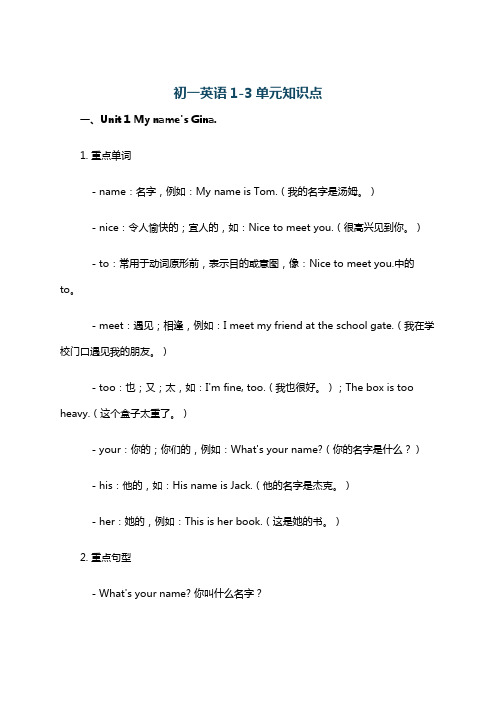
初一英语1-3单元知识点一、Unit 1 My name's Gina.1. 重点单词- name:名字,例如:My name is Tom.(我的名字是汤姆。
)- nice:令人愉快的;宜人的,如:Nice to meet you.(很高兴见到你。
) - to:常用于动词原形前,表示目的或意图,像:Nice to meet you.中的to。
- meet:遇见;相逢,例如:I meet my friend at the school gate.(我在学校门口遇见我的朋友。
)- too:也;又;太,如:I'm fine, too.(我也很好。
);The box is too heavy.(这个盒子太重了。
)- your:你的;你们的,例如:What's your name?(你的名字是什么?) - his:他的,如:His name is Jack.(他的名字是杰克。
)- her:她的,例如:This is her book.(这是她的书。
)2. 重点句型- What's your name? 你叫什么名字?- 回答:My name's...或者I'm...,例如:What's your name? My name's Gina.(你叫什么名字?我的名字是吉娜。
)- Nice to meet you. 很高兴见到你。
- 回答:Nice to meet you, too.(也很高兴见到你。
)- Are you...? 你是……吗?- 回答:Yes, I am. / No, I'm not.例如:Are you Tom? Yes, I am.(你是汤姆吗?是的,我是。
)3. 语法点- 形容词性物主代词:your(你的/你们的)、his(他的)、her(她的)。
形容词性物主代词后面要接名词,用来表示所属关系,如:your book(你的书),his pen(他的钢笔),her bag(她的包)。
英语u1—u3知识点
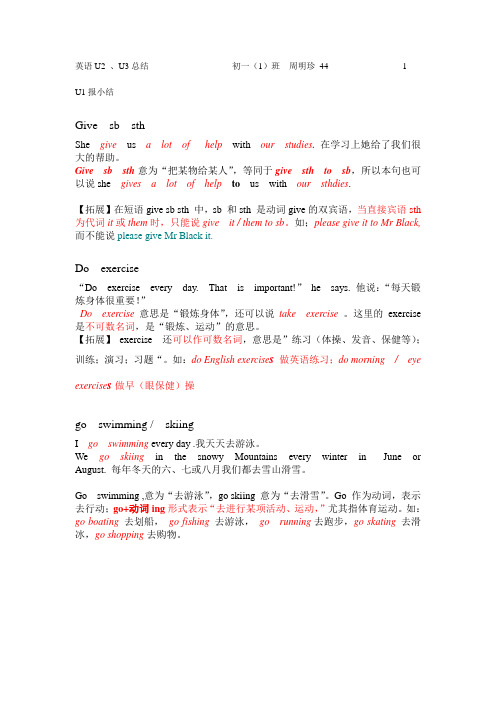
英语U2 、U3总结初一(1)班周明珍44 1U1报小结Give sb sthShe give us a lot of help with our studies.在学习上她给了我们很大的帮助。
Give sb sth意为“把某物给某人”,等同于give sth to sb,所以本句也可以说she gives a lot of help to us with our sthdies.【拓展】在短语give sb sth 中,sb 和sth 是动词give的双宾语,当直接宾语sth 为代词it或them时,只能说give it / them to sb。
如;please give it to Mr Black,而不能说please give Mr Black it.Do exercise“Do exercise every day. That is important!”he says. 他说:“每天锻炼身体很重要!”Do exercise意思是“锻炼身体”,还可以说take exercise。
这里的exercise 是不可数名词,是“锻炼、运动”的意思。
【拓展】exercise 还可以作可数名词,意思是”练习(体操、发音、保健等);训练;演习;习题“。
如:do English exercise s做英语练习;do morning / eye exercise s做早(眼保健)操go swimming / skiingI go swimming every day .我天天去游泳。
We go skiing in the snowy Mountains every winter in June or August. 每年冬天的六、七或八月我们都去雪山滑雪。
Go swimming ,意为“去游泳”,go skiing 意为“去滑雪”。
Go 作为动词,表示去行动;go+动词ing形式表示“去进行某项活动、运动,”尤其指体育运动。
牛津版英语七年级上—U1-U3强化—语法综合—语音—阅读

☆词汇复习Unit 1I. 重点词汇序号英文词性词义拓展1 v. 邀请n. 邀请,邀请函邀请某人去做某事2 adj.昂贵的n. 费用,花费adj. 便宜的3 n.代理人n. 代理处在旅行社4 adv.不久迟早提问多久用,用将来时, 回答通常用i5 v.提升,举起举起辨析raise与rise6 n.国家n. 国家adj. 国际的n. 国籍7 adj.古老的古时候,在古代8 n.历史adj. 历史的,史实的adj. 历史上著名的,有历史性的辨析:historichistorical9 n.吸引力,趣味v. 使…感兴趣adj. 感兴趣的对…感兴趣的adj. 有趣的10 adj.精彩的令人高兴n.(U) 惊奇,惊异;1. 7A U1~U3复习II. 根据音标写出下列单词及解释________/'brəuʃə/n. ___________________/swɔn/n. ___________________/brik/n. ___________________/stəun/n. ___________________/'mauntən/n. ___________________/'hɔlədi/n. ___________III. 汉译英1.妈妈打算在11月底带我去北京。
My mother _______ ________ _______ take me to Beijing at the end of November.2. 我们计划了一次去北京的旅行。
We _______ a trip to Beijing.3.我的父母正在旅行社和旅行代理人谈话。
My parents _______ ________ ______ the travel agent at the travel agent’s/agency.4.北京有很多名胜古迹,例如,长城、颐和园、天安门广场和故宫博物院等。
五年级英语书u一到u三的短语
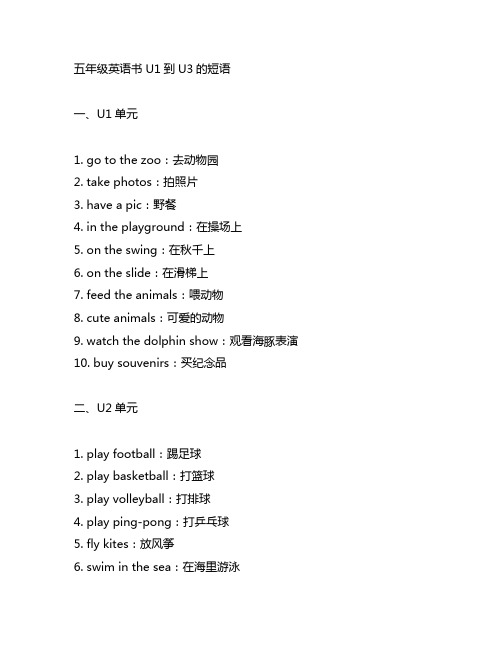
五年级英语书U1到U3的短语一、U1单元1. go to the zoo:去动物园2. take photos:拍照片3. have a pic:野餐4. in the playground:在操场上5. on the swing:在秋千上6. on the slide:在滑梯上7. feed the animals:喂动物8. cute animals:可爱的动物9. watch the dolphin show:观看海豚表演10. buy souvenirs:买纪念品二、U2单元1. play football:踢足球2. play basketball:打篮球3. play volleyball:打排球4. play ping-pong:打乒乓球5. fly kites:放风筝6. swim in the sea:在海里游泳7. play with friends:和朋友玩耍8. fish in the river:在河里钓鱼9. make sandcastles:堆沙堡10. run in the race:参加赛跑三、U3单元1. go to the theater:去剧院2. go to the cinema:去电影院3. eat popcorn:吃爆米花4. buy tickets:买票5. watch a film:观看电影6. watch a play:看话剧7. read books:读书8. play the piano:弹钢琴9. sing songs:唱歌10. dance with friends:和朋友一起跳舞以上是五年级英语书U1到U3的一些常用短语,希望对大家的学习有所帮助。
五年级英语书U1到U3的短语续写:四、U4单元11. do homework: 做作业12. play video games: 玩电子游戏13. ride a bike: 骑自行车14. take a walk: 散步15. visit my grandparents: 拜访我的祖父母16. have a family dinner: 举办家庭晚餐17. listen to music: 听音乐18. read a story: 读故事19. take a nap: 小睡20. write in my diary: 写日记五、U5单元21. go skiing: 去滑雪22. make a snowman: 堆雪人23. have a snowball fight: 打雪仗24. go ice skating: 滑冰25. drink hot chocolate: 喝热巧克力26. wear warm clothes: 穿暖和的衣服27. stay by the fireplace: 呆在火炉旁28. build a igloo: 建造冰屋29. play in the snow: 在雪中玩耍30. have a winter holiday: 度过冬季假期六、U6单元31. visit a museum: 参观博物馆32. learn about history: 了解历史33. take a tour: 进行观光旅行34. see famous p本人ntings: 观赏名画35. visit an art gallery: 参观艺术画廊36. take pictures of sculptures: 拍雕塑照片37. attend a workshop: 参加研讨会38. study ancient artifacts: 研究古代文物39. explore different cultures: 探索不同的文化40. admire the architecture: 欣赏建筑风格七、U7单元41. plant flowers: 种花42. water the garden: 浇花园43. take care of plants: 照料植物44. grow vegetables: 种植蔬菜45. mow the lawn: 割草46. have a barbecue: 烧烤47. enjoy the sunshine: 沐浴阳光48. relax in the backyard: 在后院放松49. have a garden party: 举办花园派对50. spend time outdoors: 在户外度过时间八、U8单元51. teach a pet tricks: 教宠物技巧52. walk the dog: 遛狗53. pet a cat: 抚摸猫54. feed the fish: 喂鱼55. clean the cage: 清洁笼子56. groom a pet: 给宠物梳毛57. play with a pet: 和宠物玩耍58. take care of animals: 照顾动物59. adopt a pet: 领养宠物60. love and protect animals: 爱护和保护动物上述是五年级英语书U1到U8的一些常用短语,这些短语可以帮助学生在日常生活和学习中更加流利地表达自己的想法和需求。
人教版六年级上册英语单词六年级上册英语u1-u3复习要点

六年级上册u1-u3复习要点Unit1 How can I get there?一、重点单词:地点:science museum科学博物馆post office 邮局bookstore 书店cinema 电影院hospital 医院动作:go straight 直走turn left左转turn right 右转方位:in front of :在···前面behind 在···后面near在…旁边next to 紧挨着near 在附近beside 在旁边over 在…上方on the left 在左边on the right 在右边二、重点句型:(1)Is / Are there…?某处有某物吗?肯定回答:Yes, there is. 否定回答:No, there isn’t/aren’t.(2)Where is the + 地点?... ... 在哪里?It’s + 表示地点的名词. 它... ...例句:Where is the cinema? 电影院在哪?It’s next to the bookstore. 在书店的旁边。
(3)How can + 主语+get(to)+ 地点? ... ...怎么到... ...?(如果get后面接的词为副词,则要省略介词to.)例句:How can we get to the park?How can we get there? 我们怎么到那儿?同义问路句型:Can you tell me the way to + 地点?Where is the +地点?Which is the way to + 地点?例句:How can we get to the park?=Can you tell me the way to the park?=Where is the park?= Which is the way to the park?(4 ) Turn left at the bookstore. 到书店左转。
四年级下册英语单元知识点梳理 Unit 1~Unit 3 人教PEP

er /ə/ water 水 tiger 老虎 sister 姐;妹 computer 计算机 dinner 正餐first floor 一楼library 图书馆second floor 二楼playground 操场teachers' office 教师办公室computer room 计算机房art room 美术教室 music room 音乐教室 next to 紧邻;在……近旁homework 作业 class 班;班级 forty 四十way 方向on the first floor 在一楼go to... 去……welcome to... 欢迎来到……on the second floor 在二楼This way, please. 这边请。
how many 多少Excuse me. 打扰了。
—Where's the teachers' office? 教师办公室在哪里?—It's on the second floor. 它在二楼。
—Is this the teachers' office? 这是教师办公室吗?—No, it isn't. The teachers' office is next to the library.不,不是。
教师办公室挨着图书馆。
Is that the computer room? 那是计算机房吗?—Do you have a library? 你们有图书馆吗?—Yes, we do. 是的,有。
Go to the library. Read a book. 去图书馆,看书。
Go to the teachers' office. Say hello. 去教师办公室,问好。
Go to the playground. Play football. 去操场,踢足球。
Go to the garden. Water the flowers. 去花园,浇花。
小学六年级英语考点归纳U1-U3
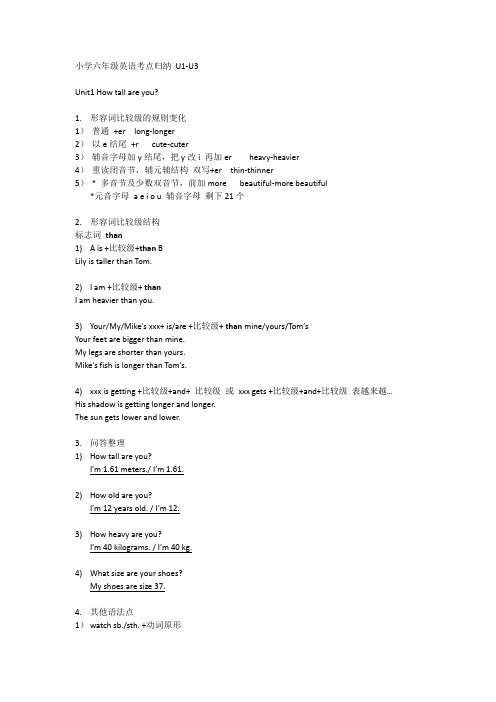
小学六年级英语考点归纳U1-U3Unit1 How tall are you?1.形容词比较级的规则变化1)普通+er long-longer2)以e结尾+r cute-cuter3)辅音字母加y结尾,把y改i 再加er heavy-heavier4)重读闭音节,辅元辅结构双写+er thin-thinner5)* 多音节及少数双音节,前加more beautiful-more beautiful *元音字母a e i o u 辅音字母剩下21个2.形容词比较级结构标志词than1) A is +比较级+than BLily is taller than Tom.2)I am +比较级+ thanI am heavier than you.3)Your/My/Mike’s xxx+ is/are +比较级+ than mine/yours/Tom’sYour feet are bigger than mine.My legs are shorter than yours.Mike’s fish is longer than Tom’s.4)xxx is getting +比较级+and+ 比较级或xxx gets +比较级+and+比较级表越来越…His shadow is getting longer and longer.The sun gets lower and lower.3.问答整理1)How tall are you?I’m 1.61 meters./ I’m 1.61.2)How old are you?I’m 12 years old. / I’m 12.3)How heavy are you?I’m 40 kilograms. / I’m 40 kg.4)What size are your shoes?My shoes are size 37.4.其他语法点1)watch sb./sth. +动词原形2)what后面接名词how后面接形容词如:what size how old3) they/we/you/名词复数后be动词用areThey are big and strong.5.疑难单词countryside 乡村shadow 影子smarter 更聪明的both 两个都become 变成lower 更低的hall 大厅Unit2 Last weekend1.动词过去式的规则变化1)普通+ed clean-cleaned3)以e结尾+d love-loved3)辅音字母加y结尾,把y改i 再加ed study-studied 4)重读闭音节,辅元辅结构双写+ed stop-stopped本书出现的不规则变化have-had sleep-slept read-read see-saw ride-rode eat-ate take-took fall- fell buy-bought feel-felt think-thought hurt-hurt2.否定句及疑问句助动词do/does/did 后加动词原形Did you go to school last Sunday?She didn’t wash her clothes yesterday.3.问答整理1)What did you do last weekend?I cleaned my room on Saturday.2)Did you play football with Tom?Yes, I did.3)How was your weekend?It was good/OK.4.其他语法点1)want to do sth. 想要做某事I want to buy the new film magazine.2)be动词过去式为was/ weream/is-wasare-werebe 动词包括is/am/are/was/were5.常见动词短语cleaned my room washed my clothes stayed at home watched TV did something else saw a film with my friends read a book had a cold went fishing6.疑难单词before yesterday better brokenenjoy saw slept lastmagazineUnit 3 Where did you go?1.其他语法点1)xx looks like xxx 看起来像It looks like a mule.You look like your mother.2)far from 远Beijing is far from the USA.2.问答整理1)Where did you go?I went to Dali with my parents.2)Who did you go with?My parents and my uncle.3)What did you do there?I rode a bike.4)What happened?I fell off my bike and hurt my foot.3.常见短语rode a horse rode a bike went camping hurt my footwent fishing ate fresh food went swimming took picturesbought gifts by plane lots of4.疑难单词went gift mule hurt pictures fell。
U1--U3英语作文

Uint 1 public signsI can see a lot of public signs in the library. They mean different things. There’s a sign on the wall. It means ‘ Be quiet’. We shouldn’t make noise in the library. Look! That sign mean ‘ No eating or drinking’. We shouldn’t eat or drink here.Now I know a lot about public signs. How about you?Unit 2 My birthdayIt is my twelfth birthday today. My birthday is on November the eighteenth. I have a birthday party today. My friends would like to come to my birthday party. They will give me a lot of birthday presents. I would like a VCD of Chinese cartoons as my birthday present. I’d like a big birthday cake for my birthday party. We sing and dance at the birthday party. I am so excited!Unit3 Sports DayToday is Sunday, but all the students are in the playground. It is Sports Day in our school. Look! The boys are having a running race. It’s very exciting. The girls are watching the race. Su Hai wants to take some photos. But she can’t find her camera. It was in her bag just now. But it isn’t there now. Let’s go and help her.Public signsToday is Saturday. Yang Ling is in the library. She likes reading very much. Now, she is reading some books about public signs. The signs mean different things. Yang Ling learns a lot about them. People/ We should keep quiet in the library. We can’t eat or drink in the library. People shouldn’t litter, either. The sign on the wall means we shouldn’t litter in the library.My birthdayToday is the seventh of December. It’s my tenth birthday. I am very happy. I have a big birthday party today. All of my friends come to my birthday party. They give me a lot of birthday presents, some books, a pair of gloves, a football… We sing and dance together. We all have a good time.。
新起点英语(一年级起点)三上u1-u3重点总结
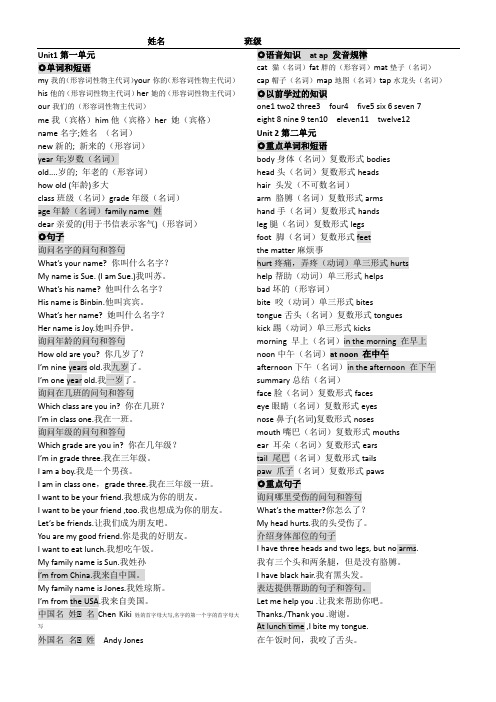
Unit1第一单元◎单词和短语my我的(形容词性物主代词)your你的(形容词性物主代词)his他的(形容词性物主代词)her她的(形容词性物主代词)our我们的(形容词性物主代词)me我(宾格)him他(宾格)her 她(宾格)name名字;姓名(名词)new新的; 新来的(形容词)year年;岁数(名词)old....岁的; 年老的(形容词)how old (年龄)多大class班级(名词)grade年级(名词)age年龄(名词)family name 姓dear亲爱的(用于书信表示客气)(形容词)◎句子询问名字的问句和答句What’s your name? 你叫什么名字?My name is Sue. (I am Sue.)我叫苏。
What’s his name? 他叫什么名字?His name is Binbin.他叫宾宾。
What’s her name? 她叫什么名字?Her name is Joy.她叫乔伊。
询问年龄的问句和答句How old are you? 你几岁了?I’m nine years old.我九岁了。
I’m one year old.我一岁了。
询问在几班的问句和答句Which class are you in? 你在几班?I’m in class one.我在一班。
询问年级的问句和答句Which grade are you in? 你在几年级?I’m in grade three.我在三年级。
I am a boy.我是一个男孩。
I am in class one,grade three.我在三年级一班。
I want to be your friend.我想成为你的朋友。
I want to be your friend ,too.我也想成为你的朋友。
Let’s be friends.让我们成为朋友吧。
You are my good friend.你是我的好朋友。
I want to eat lunch.我想吃午饭。
七年级上册英语u1u2u3知识点

七年级上册英语u1u2u3知识点七年级上册英语课程中,第一单元至第三单元是为了让学生熟悉英语学习的基础知识和词汇,逐步提高用英语进行交际的能力。
这三个单元的内容相互关联,互相补充,下面将详细介绍这三个单元的主要知识点。
单元一:认识英文1. 英语字母表: a~z,A~Z总共26个字母。
2. 人称代词: I,you,he,she,it,we,they。
3. 疑问词:What,How,Where,Who,Which,When,Why。
4. 中文和英文数字的对应关系。
5. 介绍自己和他人的基本信息。
单元二:初步欣赏英语1. 基本的问候语: Good morning/afternoon/evening,Hello。
2. 询问和回答“How are you?”3. 基本的自我介绍和介绍他人:My name is…,This is my friend…4. 学校生活词汇:teacher,student,classroom,desk,blackboard,book等。
5. 询问和回答“What’s this in English?”单元三:跟老师打招呼1. 介绍自己的年级、班级和学校名称。
2. 学习动词 to be,构成肯定句和否定句,并进行简单的对话。
3. 学习冠词a&an的用法,学习单词标记en在元音前,an在辅音前。
4. 学习常用的职业单词:doctor,driver,teacher,nurse等。
5. 介绍自己的家人和爱好等,初步训练听说读写的能力。
以上是七年级上册英语U1U2U3的主要知识点,这些知识点是学习英语的基础,掌握好这些知识点可以更准确、快速地理解和使用英语。
在学习的过程中,要保持良好的学习习惯,及时完成作业和课堂练习,丰富自己的英语知识库,积极提高英语能力。
PEP英语五年级上册U1-U3重点归纳

PEP英语五年级上册U1-U3四会单词词汇表Unit 1:young 年轻的 funny 滑稽可笑的 tall 高的 strong 强壮的kind 和蔼的、亲切的;old 年老的short矮的thin 瘦的Mr 先生like 像、喜欢strict 严格的smart 聪明的、巧妙的active 积极的、活跃的quiet 安静的、文静的very 很、非常but 但是Unit 2:Mondy 星期一Tuesday 星期二Wednesday 星期三Thursday 星期四Friday 星期五Saturday 星期六Sunday 星期天day 天have 有、吃on 在…..时候do homework 做作业watch TV 看电视read books 读书Unit 3:eggplant 茄子fish 鱼green beans 青豆tofu 豆腐potato 土豆tomato 西红柿for 为lunch 中餐we 我们tasty 好吃的sweet 甜的sour 酸的fresh 新鲜的salty 咸的favourite 最喜欢的 they’re=they are 他们是fruit 水果grape 葡萄四会句子Unit11.谁是你的英语老师?Carter先生。
Who’s your English teacher? Mr. Carter.2.他长得什么样?他高而强壮。
What’s he like?He’s tall and strong.3.她很安静吗?不是的。
她很活跃的。
Is she quiet? No, she isn’t. She’s very active.4.她很严格么?是的,但她很和蔼的。
Is she strict? Yes, she is, but she’s very kind.Unit25 今天星期几?星期二。
What day is it today? It’s Tuesday.6 星期二你们有什么课? What do you have on Tuesdays?7 我们有数学和科学课。
Unit1-Unit3课文原文及翻译英汉对照版(素材)人教PEP版英语四年级上册
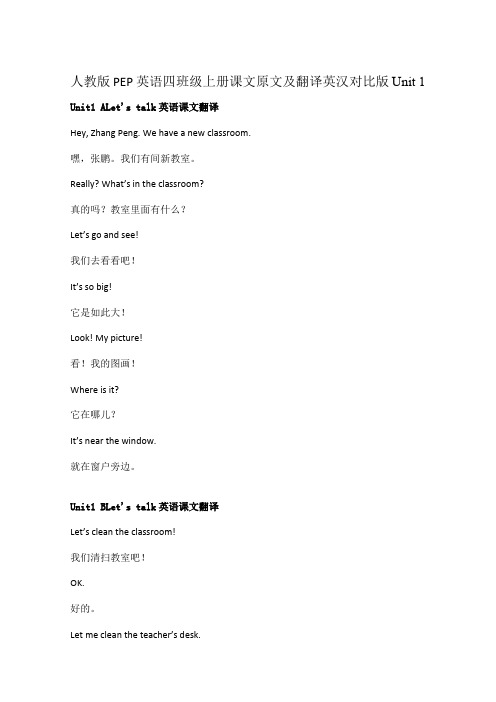
人教版PEP英语四班级上册课文原文及翻译英汉对比版Unit 1 Unit1 ALet's talk英语课文翻译Hey, Zhang Peng. We have a new classroom.嘿,张鹏。
我们有间新教室。
Really? What’s in the classroom?真的吗?教室里面有什么?Let’s go and see!我们去看看吧!It’s so big!它是如此大!Look! My picture!看!我的图画!Where is it?它在哪儿?It’s near the window.就在窗户旁边。
Unit1 BLet's talk英语课文翻译Let’s clean the classroom!我们清扫教室吧!OK.好的。
Let me clean the teacher’s desk.我来擦讲台。
Let me clean the windows.我来擦窗户。
Let me help you.我来关心你。
Thank you.感谢你。
Unit1 BLet's checkListen and tick (√)or cross (×) .英语课文翻译Listen and tick (√) or cross(×).1. Girl: Let’s clean the classroom, Mike.1. 女孩:我们清扫教室吧,迈克。
Boy: OK. Let me clean the blackboard!男孩:好的。
我来擦黑板!Girl: Let me clean the desks!女孩:我来擦书桌!2.Girl: This is my classroom. The walls are green, the floor is white, and the desks are brown.2.女孩:这是我的教室。
墙壁是绿色的,地板是白色的,书桌是棕色的。
英语上册U1-U3短语总结

U11. 断断续续off and on2. 对…感到腻味be bored by ...3. 觉得…枯燥难懂find ... dull and difficult4. 以…而出名have a reputation for...5. 据说某人…sb. be said to be ...6. 拘谨刻板,落后于时代formal, rigid and out-of-date7. 随笔小品文an informal essay8. 躺在沙发上lie on a sofa9. 不得不面对…face up to ... 10. 围坐在晚餐桌旁be seated around the supper table 11. …重现在我脑海中... reawake in my mind 12. 自得其乐for my own joy13. 违反规定violate the rules 14. 不及格分a failing grade15. 别无选择,只好做…There is no choice but to do... 16. 更不可思议的是what’s more 17. 专心听讲listen attentively 18. 乐乎乎地开怀大笑laugh with open-hearted enjoyment 19. 心花怒放pure delight 20. 最后的时刻at the eleventh hour1、沉闷的,无趣的Dull, lifeless, cheerless, tedious2、写,写出,写下来T urn out, write, compose, put down3、合理的,得体的proper, respectable4、人们想起什么I recalled the laughing arguments ...Vivid memories of sth.Come flooding back to sb.sth. reawakes in on one’s mind5、再体验recapture, relive6、快乐,幸福Joy, pleasure, delight, happiness7、嘲笑,嘲弄contempt, ridicule8、话题,题目topic, title1. 我们的经理在想法上是很如此顽固,一成不变的,他从不听从别人的意见。
知识点总结(Unit1-3)(知识清单)人教精通版英语四年级上册

人教精通版五年级上册知识点总结(Unit1Unit3)一单词辨析Unit1:国家1.China【释义】n.中国2.America【释义】n.美国3.England【释义】n.英国4.Singapore【释义】n.新加坡5.Canada【释义】n.加拿大家庭成员及人物身份1.friends【释义】n.朋友2.boy【释义】n.男孩3.girl【释义】n.女孩4.brother【释义】n.兄弟5.sister【释义】n.姐妹职业1.teacher【释义】n.教师2.farmer【释义】n.农民3.postman【释义】n.邮递员4.doctor【释义】n.医生5.nurse【释义】n.护士6.driver【释义】n.司机;驾驶员Unit2基数词:1.one【释义】num.一2.two【释义】num.二3.three【释义】num.三4.four【释义】num.5.five【释义】num.五6.six【释义】num.六7.thirteen【释义】num.十三8.fourteen【释义】num.十四9.fifteen【释义】num.十五10.sixteen【释义】num.十六11.seventeen【释义】num.十七12.eighteen【释义】num.十八13.seven【释义】num.七14.eight【释义】num.八15.nineteen【释义】num.十九16.twenty【释义】num.二十17.nine【释义】num.九18.ten【释义】num.十Unit3:1.pineapple【释义】n.菠萝2.lemon【释义】n.柠檬3.pear【释义】n.梨4.apple【释义】n.苹果5.watermelon【释义】n.西瓜6.kiwi fruit【释义】n.猕猴桃7.orange【释义】n.橙子,橘子8.banana【释义】n.香蕉蔬菜:1.potato【释义】n.土豆;马铃薯2.tomato【释义】n.西红柿3.carrot【释义】n.胡萝卜4.cucumber【释义】n.黄瓜5.eggplant【释义】n.茄子6.green pepper【释义】n.青椒二句型应用1.【课文应用】This is my new friend.这是我的新朋友。
北师大版高中英语必修一模块1U1U2U3课文讲解

课文原文M1 U1 L1 A Perfect DayPassage 1 A Couch PotatoForty-three-year-old Brian Blakey from Birmingham is sitting on his sofa and telling me about his perfect day.[When I wake up ]I don't get up immediately. I turn on the televisionand watch the children's programmes until about half past ten. Then I get up, go downstairs and switch on the TV in the living room. For lunch, I have biscuits and a glass of milk, and I watch the news. In the afternoon, I often watch – they're showing some good ones at the moment. In the evenings, I often watch TV series or sport and the news again I like the main news at six o'clock. At nine thirty,if there is a good play on BBC 2, I switch over and watch it. Then at night, I watch films and I usually switch off the TV at about two o'clock I never watch TV all night.I watch TV for sixteen or seventeen hours a day. I also do some exercise every day. I take Tina, [the dog], for a walk every afternoon. I don't go far, of course. I walk to the wall outside my house. I always take my portable TV and I sit on the stone wall [while the dog walks round in a circle].Of course, I couldn't live this lifestyle without a good wife. She's not here now (because she's working), but she always makes my meals. We haven't got much money, you know, but we're happy. Sit down and watchTV Here's the remote control. You've got the world at your feet. And in your hand.Passage 2 A WorkaholicThirty-six-year-old Bob Black is sitting at his desk and working his way through his paperwork.I normally wake up about five minutes [before my alarm clock goes off]. As soon as I hear my alarm clock, I jump out of my bed. It takes me less than fifteen minutes to wash, get changed, have breakfast, leave home and get on a bus.I am always the first person to get to the office. The mornings are always very busy and the afternoons are even busier! Meetings and phone calls take up a large part of the day. Every minute of the day is filled with urgent matters. By around eight o'clock, I usually find some time to do my own paperwork and answer some personal e-mails.[When I get home at about ten], I look at some documents (that I bring back from the office) [so that I can be ready for the next day's work].I get to bed around midnight [when my wife and children are already asleep].I seldom have time for fun and other activities with my family. My family complains about it.But I try to work hard [so that I can make more money for them]. Besides, I get bored [if there's nothing to do]. I like being busy.U1 L4 City and CountryDebbie is an accountant in a large company in the centre of London.I need to be in my office by nine o'clock [so I usually get up at seven o'clock]. I travel to work on “the tube”.That's what people call the underground in London. It takes about fifty minutes. Usually, it's so crowded that I can't find anywhere to sit. I just stand. I'm always tired before I arrive at work. I don't like the underground!get a sandwich in a nearby sandwich shop or I just have some biscuits and a cup of coffee. Then in the afternoon, I return to the paperwork in the office.On Monday nights, I have dance classes, and on Wednesday nights, I go to the gym. I need to do that [because I don't get enough exercise otherwise]. On Tuesday and Thursday nights, I have French classes. I work for a French company[ so I think study ing French will help me in my job].I go to the cinema almost every weekend. Sometimes, if the weather forecast is good, my friends and I drive to the countryside for a weekend break. We like to visit nice, quiet places [far away from the city] and go walking [where there are no shops, crowds or the tube]. That fresh air is so good for my lungs. I love it.Paul lives in a small village in the north of England.I usually get up at four o'clock every morning [when it's still dark].I live and work on the farm //so I don't need to travel. After a big breakfast in my house, I walk out of the front door and I'm already at work.There are many things to do on the farm all day. We don't have the same work hours [that office workers in the city have]. We do jobs [when they need to be done] //and that could be early in the morning or late at night.I have cows, sheep, pigs and chickens on my far m. I have to make sure (that) they are free of sickness. I also grow wheat and vegetables //so there are many things to look after.In the evening, I like to play with my children. I have two children, [a boy and a girl]. They are six and eight years old. I also like to study. Right now I am studying Chinese by distance learning. I am very interested in China and it's my dream to see the Great Wall one day.I love movies. My wife calls me a “movie fan”.in my village so I don't get the chance to go very often. I go about twice a year,[ usually when I go to London with my family]. We take a weekend break there [when I am not too busy on the farm]. My wife loves looking [in the clothes shops ]and I like all the crowds and the noise. I alsolike to buy a few cigars. Unfortunately, my wife isn'tMy son and daughter love to ride on London's red buses and they especially love to go on the tube!M1 U1 L1完美的一天Passage 1 终日懒散在家看电视的人-----沙发土豆(来自伯明翰的43岁的布莱恩*博莱克正坐在沙发上向我讲述他美妙的一天。
最新新教材译林牛津英语九年级上U1-U3词组梳理

Unit1词组梳理Welcome to the unit1. know yourself 了解自己2. Let me have a look. 让我看一看。
3. be generous to sb. 对某人慷慨4. make them feel good 使他们觉得好5. share sth. with sb. 与某人分享某物6. agree 反义词disagree(1) 涉及讨论的题目用about。
They never agree about politics.(2)要确定一样事情用on。
Can we agree on a date for the next meeting?(3)涉及一件建议或计划用to。
He’s agreed to our suggestion about the holiday.(4)涉及意思、想法、分析、解释以及涉及人的时候用with。
They might not agree with his opinions.(5)agree 后可接动词不定式或宾语从句。
We agree to leave at once.7. eat up 吃光,吃完8. people with different personalities 有不同性格的人9. behave in different ways 用不同方式表现10. recommend a classmate for a position in your class 推荐一个同学获得你班上的一个职位11. be curious about 对…好奇12. energetic=full of energy 充满活力的13. be patient with 对…有耐心14. keep sth. in good order 把某事保持良好的秩序15. show off 炫耀16. come up with 想出17. play football for hours 踢足球了几小时18. repeat grammar for us 为我们重复语法19. get angry easily 容易生气20. make a good accountant 做一个好的会计21. like creative jobs 喜欢有创造性的工作22. It’s terrible for me to work without speaking all day long. 对我来说整天不说话的工作太可怕了。
四年级英语上册单词总结u1到u3

四年级英语上册单词总结u1到u3 Unit 11. appleMeaning: a round fruit with red or green skin and a whitish insideExample sentence: I like to eat an apple every day.2. bagMeaning: a container for carrying thingsExample sentence: Please put your books in your bag.3. catMeaning: a small animal with fur and whiskersExample sentence: My sister has a pet cat named Mittens.4. dogMeaning: a furry animal that is often kept as a petExample sentence: My dog loves to play fetch in the park.5. elephantMeaning: a very large animal with big ears and a long trunkExample sentence: The elephant at the zoo was eating hay.Unit 21. frogMeaning: a small animal that has smooth skin and long legs for jumpingExample sentence: We can hear frogs croaking by the pond at night.2. grapesMeaning: small, juicy fruits that grow in clustersExample sentence: I like to eat frozen grapes as a snack.3. houseMeaning: a building where people liveExample sentence: Our house has a red front door.4. ice creamMeaning: a sweet frozen treat made from milk and sugarExample sentence: I love to eat strawberry ice cream on hot days.5. jumpMeaning: to move off the ground by pushing with your legsExample sentence: The kids like to jump rope during recess.Unit 31. kiteMeaning: a light frame covered with paper or fabric flown in the airExample sentence: We had fun flying kites at the park.2. lionMeaning: a large, powerful cat that lives in groups called pridesExample sentence: The lion at the zoo roared loudly.3. monkeyMeaning: a clever animal with a long tail and nimble handsExample sentence: The monkey at the zoo was swinging from branch to branch.4. nestMeaning: a structure that birds build to lay their eggsExample sentence: We found a bird's nest in the tree in our backyard.5. orangeMeaning: a round citrus fruit with a thick orange skinExample sentence: I like to drink orange juice in the morning.This is a summary of the vocabulary words covered in Units 1 to 3 of the fourth grade English textbook. Practice using these words in sentences to improve your English language skills.。
英语六年级上册U1-U3单元知识点总结
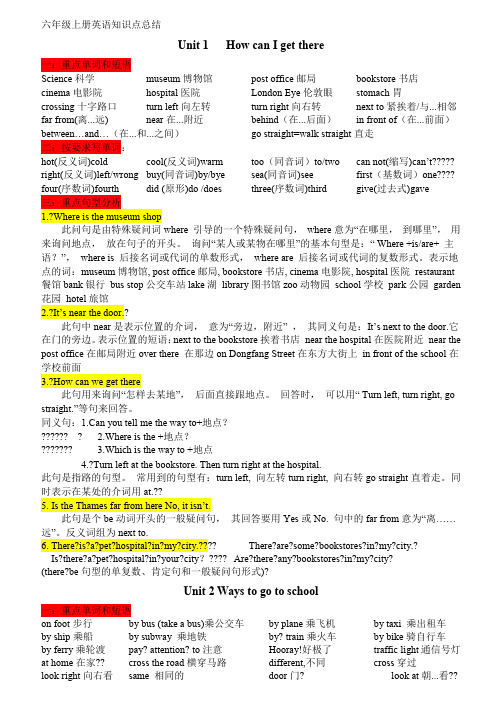
六年级上册英语知识点总结Unit 1 How can I get there一:重点单词和短语Science科学museum博物馆post office邮局bookstore书店cinema电影院hospital医院London Eye伦敦眼stomach胃crossing十字路口turn left向左转turn right向右转next to紧挨着/与...相邻far from(离...远) near在...附近behind(在...后面)in front of(在...前面)between…and…(在...和...之间)go straight=walk straight直走二:按要求写单词:hot(反义词)cold cool(反义词)warm too(同音词)to/two can not(缩写)can’t????? right(反义词)left/wrong buy(同音词)by/bye sea(同音词)see first(基数词)one???? four(序数词)fourth did (原形)do /does three(序数词)third give(过去式)gave三:重点句型分析1.?Where is the museum shop此问句是由特殊疑问词where 引导的一个特殊疑问句,where意为“在哪里,到哪里”,用来询问地点,放在句子的开头。
询问“某人或某物在哪里”的基本句型是:“ Where +is/are+ 主语?”,where is 后接名词或代词的单数形式,where are 后接名词或代词的复数形式。
表示地点的词:museum博物馆, post office邮局, bookstore书店, cinema电影院, hospital医院restaurant 餐馆bank银行bus stop公交车站lake湖library图书馆zoo动物园school学校park公园garden 花园hotel旅馆2.?It’s near the door.?此句中near是表示位置的介词,意为“旁边,附近” ,其同义句是:It’s next to the door.它在门的旁边。
- 1、下载文档前请自行甄别文档内容的完整性,平台不提供额外的编辑、内容补充、找答案等附加服务。
- 2、"仅部分预览"的文档,不可在线预览部分如存在完整性等问题,可反馈申请退款(可完整预览的文档不适用该条件!)。
- 3、如文档侵犯您的权益,请联系客服反馈,我们会尽快为您处理(人工客服工作时间:9:00-18:30)。
] ( 朋友 ) .
对老师尊称时我们可以用Mr.(女士)或者Mrs (男士)。如果老师姓刘,可以说Mr.Liu 或 者Mrs Liu.
(齐读一遍)
精美文章
I am Helan, I have a good famliy My mother is a driver ,her name is Mary ,Her hobby is cooking. My father is a doctor ,his name is Alan , his hobby is play soccer(足球).Last,My sister is a Middle school student .Her is a basketball player I like my famliy it’s a nice famliy
学到了一些词语运用,如何称呼长辈,也学 到一些动名词。
练习
1. 中国 China
--------------------------------------------------
2. 学校 3. 中间的
school middle1. My [name
]( 名字 )is Helan.
friend
2. Gina have a [ Her name is Alice.
It’s 2513104
A 2.My name is Alan Black. Alan is My__name
A.first
st
C./
D.famliy
first 3. I am Eric. Eric is my________name.
4. Do your like your famliy ? Yes ___,I do
uncle
1. Your mom’s brother is __________ D 2. Your sister’name is____
A. Paul
B. Dale
C. Tim
D. Kate
下面,我们来听一首歌
打开
telephone number 1. What’s your __________ ________ ?
pen
ID card
bag
读出闪烁的单词
He is a hero. Who is he? He Mao Zedong is_________
pancil I have a_______(/pans u/)
bag I don’t havea_______(/baeg/)
e
通过这节课大家学到了什么?
